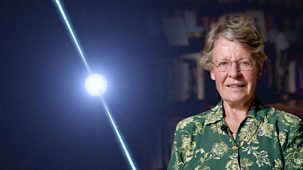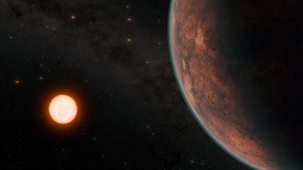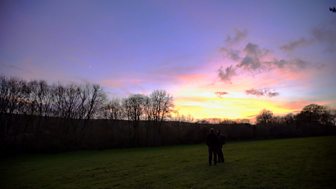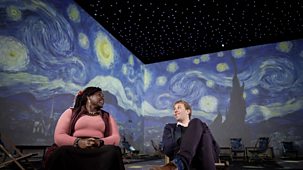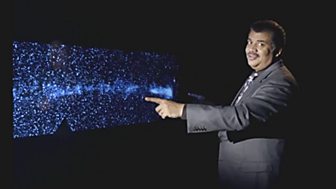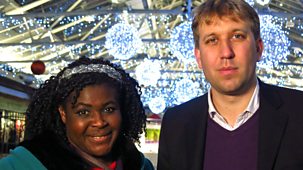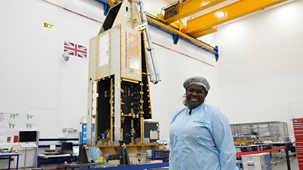
Space Boom Britain
Britain’s space industry is booming. According to UK Space Agency, its annual income now stands at £16.4bn, and it employs over 45,000 people. Britain has always been a leader in the world’s aerospace industries. Airbus’s huge manufacturing plant in Stevenage was originally owned by de Havilland, where they made ‘Blue Streak’, Britain’s intercontinental ballistic missile which became part of the ESA's 'Europa' rocket. Before becoming part of Airbus, the business then called Astrium had focused on satellites and were Maggie’s employers.\n\nMaggie meets Liz Seward who explains that while over half their business is building communications satellites, they are also involved in research instruments too. One of their recent creations – the Solar Orbiter – has not yet reached its final operational position in space, but has recently sent back spectacular pictures of coronal mass ejections. Back in the factory, Maggie sees a new satellite in the making. ‘Biomass’ is a European Space Agency project that will measure the amount of carbon trapped in the earth’s flora, building up a comprehensive 3D picture of the planet’s greenery. This is done using a specific type of radar that uses comparatively long wavelengths and consequently requires a huge 15m receiver – which in turn creates a huge challenge for its designers. \n\nThere are a vast number of job types required to build a spacecraft – and Maggie discovers perhaps the most surprising – that of crystal maker. Airbus in Stevenage is the manufacturer of the world’s purest quartz crystal. It is needed several times over in every satellite for calibration purposes. Because quartz vibrates at a specific frequency when an electrical current is applied to it, it is a vital constant in a world of wandering electronic systems. To be sure of supply and quality, Airbus makes its own. It’s an expensive commodity – a house-brick-sized crystal of space quality quartz is worth tens of thousands of pounds.\n\nAbout 80 miles west of Stevenage, and at the other end of the business scale, Chris visits Oxford Space Systems, whose CEO Sean Sutcliffe explains that while microsatellites are opening up the industry to more companies, they pose challenges of their own because of their size. These satellites have tiny spaces on the rockets that launch them, but need quite sizeable antennas and receivers to communicate with people and machines on earth. This is OSS’s business – to provide novel engineering solutions in packing up and unfurling these structures. They combine the latest materials science with knitting and origami to produce antennas that extend to hundreds of times their packed length and receivers that unfurl like beautiful hi-tech flowers. \n\nOf course, all spacecraft need rigorous testing before deployment. Maggie visits RAL-Space, who provide these services. She discovers that not only the conditions of space must be replicated in huge vacuum chambers, but that the experience of being launched must also be gone through. This means being shaken on a vibration table that can be programmed to replicate the precise vibration profile of the launch rocket and being shocked to simulate the firing of the explosive bolts that separates the spacecraft from the rocket. This is done by attaching critical components to a steel plate that then has a steel projectile fired at the plate’s opposite side.\n\nSo far, so good. But the success of the satellite has brought with it a huge problem. Dead and broken satellites are clogging up the available orbits and could makes things even worse if anything crashes into them. Chris visits multinational Japanese company Astroscale who have come up with a solution in the form of another satellite, controlled from their mission control in the UK. Their spacecraft – ELSA-d – is a proof of concept for a satellite retirement service, which it is hoped could clean up the dangerously cluttered low earth orbits\n\nPete Lawrence is on hand to tell us about the surreally beautiful phenomenon of noctilucent clouds, ice crystals in the upper atmosphere lit by the sun from beyond the horizon. The effect has become more common in recent years, because of the increase in rocket launches, which leave water in their wake as they leave the Earth.\n\nFinally, Maggie shows Chris the final piece of evidence that Britain’s space industry is going from strength to strength, when they visit the new National Satellite Test Facility. This purpose-built, awe-inspiring, cathedral-sized building is capable of comprehensively testing the largest satellites from the UK and abroad. It houses a 20m-long vacuum chamber with a 7m diameter, the country’s largest faraday cage and vibration tables large enough to test whole spacecraft. And a scoop for the Sky at Night: it’s the first time that TV cameras have been allowed into the facility, which is scheduled to open in the second half of 2021.
Source: BBC 4
Most recent episodes of The Sky at Night
The Sky At Night
Space Mysteries: The Sky At Night Meets Curious Cases
Do aliens exist, and can we talk to them? What does a black hole sound like? Does the universe look like a doughnut? In a spectacular season finale, The Sky at Night teams up wi ...
13-11-2025
BBC 4
The Sky At Night
Brits In Space
Three, two, one, lift off! This edition launches into the extraordinary - and extraterrestrial - world of astronaut training, discovering what it truly takes to become a Europea ...
15-10-2025
BBC 4
The Sky At Night
The Expanding Universe
The team explores one of the greatest discoveries of modern astronomy - that our universe is expanding - and the new questions it raises about how the cosmos works.\n\nIn the 19 ...
10-09-2025
BBC 4
The Sky At Night
Queen Of Pulsars
Dame Jocelyn Bell Burnell is a discoverer and an explorer of the distant cosmos, and she has walked among the stars. She discovered the first pulsar in 1967 - a discovery so imp ...
14-08-2025
BBC 4
The Sky At Night
Exoplanets - Strange New Worlds
The team go on a cosmic adventure, exploring one of the newest areas of modern astronomy – the search for exoplanets, the distant bodies that orbit stars beyond our own so ...
16-07-2025
BBC 4
The Sky At Night
Greenwich: A Journey Through Space And Time
To celebrate the 350th anniversary of the Royal Observatory, the team recreate history. \n\nIn the times of the early Astronomers Royal, scientists would gather at spectacular d ...
12-06-2025
BBC 4
The Sky At Night
Secrets Of The Red Planet
Could life have once thrived on Mars? What mysterious force is moving large boulders across its dusty surface today? And will a return trip to our neighbouring planet ever be po ...
15-05-2025
BBC 4
The Sky At Night
Asteroid Strike?
The team explore one of the biggest stories in space news, the ‘city killer’ asteroid 2024 YR4. First observed on 27 December 2024, it soon became one of the biggest ...
17-04-2025
BBC 4
The Sky At Night
Ancestral Skies
This month, The Sky at Night teams up with BBC Ideas to discover the secrets of archaeology and astronomy and to reflect on our ancestral skies. \n\nThroughout history and acros ...
14-11-2024
BBC 4
The Sky At Night
Question Time Special
Get ready for The Sky at Night’s annual Question Time Special, where viewers get the opportunity to ask the questions they have always wanted answered about our universe.\ ...
08-10-2024
BBC 4
Most popular episodes of The Sky at Night
The Sky At Night
Wonders Of The Night Sky
The Sky at Night celebrates one of the most profound, moving and enjoyable activities there is - the ancient art of looking up, studying and marvelling at the night sky. The pro ...
10-12-2017
BBC 4
The Sky At Night
Dark Skies
Dr Maggie Aderin-Pocock and Professor Chris Lintott visit the Van Gogh Immersive Experience to seek inspiration in one of the world’s most famous works of art, Starry Nigh ...
12-01-2022
BBC 4
The Sky At Night
Telescope Takeover
The team travel to the island of La Palma in the Canary Islands where they take control of some of the world's largest telescopes to view the most spectacular sights in the nigh ...
12-02-2017
BBC 4
The Sky At Night
Question Time Special
A special Question Time edition of the programme, recorded at the University of Exeter as part of the British Science Association’s Science Festival.\n\nThe panel is chair ...
12-10-2023
BBC 4
The Sky At Night
Mapping The Milky Way
The Gaia space telescope is not just create the ultimate star map of the Milky Way. It is also showing us our galaxy's past and how it will change in the future.\n\nThe Sky at N ...
12-05-2021
BBC 4
The Sky At Night
How Gravity Shapes The Universe
The team travels to the Brecon Beacons AstroCamp to see how gravity shapes the universe. Chris finds out about the newest moon in the solar system.
18-05-2014
BBC 4
The Sky At Night
Guides: 3. Stars
For as long as humans have walked the Earth, the stars have fascinated us. But we have come a long way since the earliest days of astronomy when we had nothing but our eyes to o ...
09-01-2022
BBC 4





